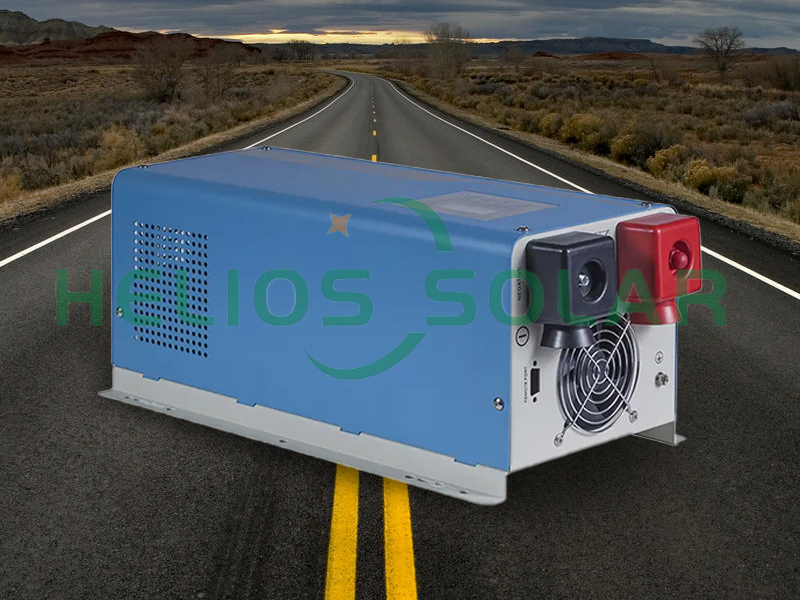Off-grid solar power systems are becoming increasingly popular as an alternative way to harness renewable energy. These systems utilize an array of solar panels to generate electricity, which is then stored in batteries for later use. However, in order to effectively utilize this stored energy, a key component called an off-grid inverter is required. In this blog, we’ll take a closer look at the role of off-grid inverters in converting stored DC power into usable AC power, and discuss their importance in off-grid solar setups.
Functions of off-grid inverter:
1. Conversion: Off-grid inverters accurately convert stored DC power into AC power, making it compatible with common household appliances and equipment. This ensures a constant and stable power supply even when the solar panels are not actively generating electricity, such as during cloudy or nighttime conditions.
2. Voltage regulation: The off-grid inverter monitors and regulates the voltage level to ensure that the AC power output remains within the safe working range of the electrical equipment. Maintaining a stable voltage level is critical to protecting appliances and preventing damage caused by voltage fluctuations.
3. Power management: Off-grid inverters effectively manage and distribute available power according to the needs of the load. By prioritizing power usage and managing battery charging, these inverters maximize the use of stored energy, resulting in reliable power for longer.
4. Battery charging: Off-grid inverters also play an integral role in charging batteries, which store excess energy generated during peak periods of sunlight. They optimize the battery charging process, ensuring the battery receives the right amount of current and voltage, thereby preserving its lifespan and improving overall performance.
Applications of off-grid inverters
Remote areas: Off-grid inverters are often used in remote areas that are not connected to the main grid. These areas may include cabins, vacation homes, or off-grid campsites. Off-grid inverters enable these locations to receive a reliable supply of electricity from renewable energy sources such as solar or wind.
Emergency Backup Power: Off-grid inverters are often used as backup power systems during emergencies or power outages. They can provide power to vital appliances and equipment, ensuring critical functions can still operate until mains power is restored.
Mobile and Recreational Vehicles: Off-grid inverters are used in mobile homes, RVs, boats, and other recreational vehicles to provide power while on the move. They allow users to power appliances, charge batteries, and run essential electronic devices while traveling or camping in remote areas.
Rural Electrification: In many rural areas where grid connections are limited or non-existent, off-grid inverters are used to power homes, schools, clinics, and other community buildings. These inverters can be combined with renewable energy sources such as solar or small hydro to create sustainable off-grid power systems.
Off-grid communities: Off-grid inverters play a vital role in off-grid communities or eco-villages, which are intentionally designed to be self-sufficient and independent from the public grid. These inverters are combined with renewable energy and energy storage systems to provide necessary power for daily life and community activities.
Agricultural Applications: Off-grid inverters have many uses in agriculture, such as powering irrigation systems, livestock farming, or running farm equipment. They enable farmers in remote areas to provide reliable power supply for their agricultural activities.
Telecommunications infrastructure: Off-grid inverters are also used in telecommunications infrastructure such as cell towers or telecommunications stations. These inverters ensure that critical communications equipment remains powered even in areas with limited or unreliable grid connections.
Research Stations and Scientific Expeditions: Off-grid inverters are used at remote research stations, scientific expeditions, or fieldwork sites where power is limited. They provide reliable and independent power for scientific instruments, data acquisition systems, and communications equipment. These are just a few examples of off-grid inverter applications. Their versatility and ability to provide reliable power from renewable energy sources make them an important component of a variety of off-grid and remote power systems.
In conclusion
The off-grid inverter is an important link in the component chain that makes up the off-grid solar power generation system. They help convert direct current from solar panels into alternating current needed for daily life. These inverters can also regulate voltage, manage power distribution, and charge batteries efficiently, optimizing energy use in off-grid areas. As renewable energy sources continue to gain traction, off-grid inverters play an increasingly important role in ensuring efficient use of solar panel power, thereby contributing to sustainable living and reducing reliance on the traditional grid.
If you are interested in off-grid inverters, welcome to contact Radiance to read more.
Post time: Sep-22-2023


